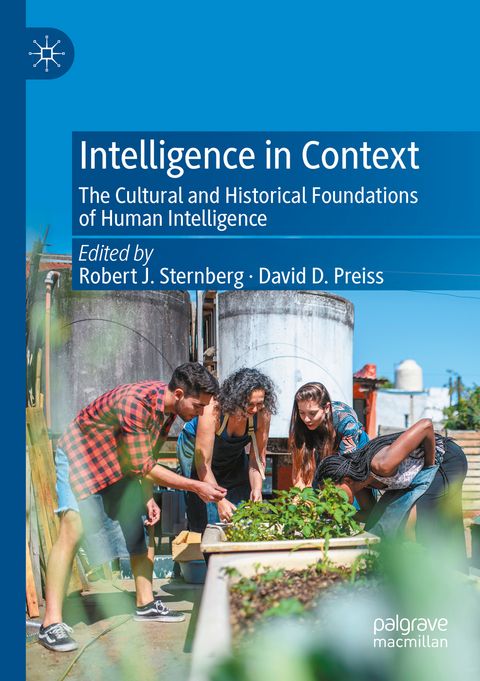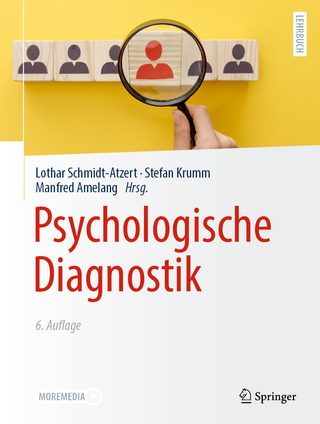
Intelligence in Context
Springer International Publishing (Verlag)
978-3-030-92800-1 (ISBN)
This book reflects on the various ways in which intelligence can manifest itself in the wide range of diverse contexts in which people live. Intelligence is often viewed as being tantamount to a score or set of scores on a decontextualized standardized intelligence test. But intelligence always acts within a sociocultural context. Indeed, early theorists defined intelligence in terms of adaptation to the environment in which one lives. The tradition of decontextualization is old, dating back to the very beginning of the 20th century with the development of the Binet-Simon Intelligence Scales. This tradition is not only old, however, but obsolete. Because people live in different sociocultural as well as physical environments, intelligence can take somewhat different forms in different places and even at different times. The chapters in this edited volume show that intelligence viewed in the abstract is a somewhat vacuous concept - it needs to be contextualized in terms of people's physical and sociocultural surroundings.
lt;p>Robert J. Sternberg is Professor of Psychology at Cornell University, USA and Honorary Professor of Psychology at the University of Heidelberg, Germany. His PhD is from Stanford and he holds 13 honorary doctorates. Sternberg is past-president of the American Psychological Association and of the Federation of Associations in Brain and Behavioral Sciences.
David D. Preiss is Professor of Psychology at the Pontificia Universidad Catolica de Chile. He holds a PhD in Psychology from Yale University and is a fellow of the Association for Psychological Science. His research interests lie in investigating individual differences in higher order cognition and the psychology of creativity. He is the co-editor of multiple books on intelligence, creativity, writing and educational psychology and the author of many papers and book chapters in both English and Spanish.
1. Introduction, Robert J. Sternberg.- 2. Intelligence as Ecological and Cultural Adaptation, John W. Berry.- 3. Adaptive Intelligence and Cultural Evolution, Chi-yue Chiu, Hiu-sze Chan, Sau-lai Lee, and Jennifer Yuk-Yue Tong.- 4. A Brief History of IQ Testing: Fixed vs. Malleable Intelligence, Alan S. Kaufman, Dowon Choi, Hansika Kapoor, James C. Kaufman.- 5. The Idea of a Peculiarly Female Intelligence: A Brief History of Bias Masked as Science, Gerd Gigerenzer.- 6. Intelligence and Wisdom in Chinese Intellectual History and in Modern Day Taiwan. Shih-ying Yang, Kimberly Y. H. Chang, and Shin-yi Huang.- 7. The Status of Intelligence as a Panhuman Construct in Cross-Cultural Psychology, Johnny R. J. Fontaine and Ype H. Poortinga.- 8. Cultural intelligence: From Intelligence in Context and across Cultures to Intercultural Contexts, Kok Yee Ng, Soon Ang, Thomas Rockstuhl.- 9. Cultural change in Africa under the Pressure of HIV/AIDS: The Role of Natively Developed Intelligence, Mei Tan, Elena L. Grigorenko.- 10. Taking an Intelligence Test: Does the Context Matter?, Adrian Furnham.- 11. A Contextual Approach to Research on Intelligence and Complex Task Performance, David Z. Hambrick.- 12. Mindsets of Intelligence: Their Development, Consequences, and Relation to Group-based Inequality, Lin Bian.- 13. Re-Envisioning Intelligence in Cultural Context, Lisa Suzuki, Taymy Josefa Caso, Aysegul Yucel.- 14. Challenges for Intelligence Today: Combatting Misinformation and Fake News, Stephen J. Ceci, Wendy M. Williams.- 15. Human intelligence in the Time of the Anthropocene, David D. Preiss.- 16.Time Bomb: How the Western Conception of Intelligence Is Taking Down Humanity, Robert J. Sternberg.- 17. Conclusion: Intelligence Does Not Inhere within the Individual but rather in Person x Task x Situation Interactions, Robert J. Sternberg, David D. Preiss.
| Erscheinungsdatum | 21.11.2023 |
|---|---|
| Zusatzinfo | XXV, 436 p. 22 illus. |
| Verlagsort | Cham |
| Sprache | englisch |
| Maße | 148 x 210 mm |
| Gewicht | 602 g |
| Themenwelt | Geisteswissenschaften ► Psychologie |
| Schlagworte | Cognitive Intelligence • Creativity • Cultural Adaptation • ecological adaptation • Emotional Intelligence • human ability • human expertise • Intelligent Models • IQ • Social Intelligence |
| ISBN-10 | 3-030-92800-4 / 3030928004 |
| ISBN-13 | 978-3-030-92800-1 / 9783030928001 |
| Zustand | Neuware |
| Haben Sie eine Frage zum Produkt? |
aus dem Bereich


